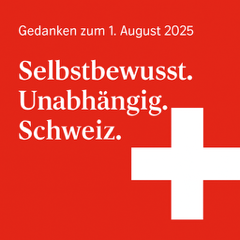Thoughts on August 1st, 2025

Thougts on August 1st 2025
Today’s awakening on Swiss National Day was probably marked by little joy in many places.
Customs shock! Now the customs hammer is coming down hard!
Headlines like this and similar ones have probably brought many people back down to earth with a bump. Thoughts on this from Koni.
Thoughts on August 1, 2025
Self-confident. Independent. Switzerland.
In times of international turmoil and in response to the “tariff shock” from the US, I believe Switzerland must focus primarily on its strengths.
Switzerland needs a clear strategy now. Self-confidence, independence, and good relations are the cornerstones of such a strategy.
There is no need for big words. Thanks to its tradition of neutrality, Switzerland can work effectively and discreetly to reduce its political, economic, military, and cultural dependence on the US. Switzerland will be forced to assess its relations with the US more realistically and objectively. Only in this way can it maintain its status as a successful and respected small state on the international stage.
This requires a strategic change of course on several levels.
Point 1: Politics
Switzerland must represent its diplomatic interests even more clearly. In doing so, it should focus on prudence and pragmatism rather than sentimentality. The US is no longer a natural “friend,” but a potential cooperation partner, sometimes as an ally, sometimes as an adversary.
Switzerland should strengthen its reputation as a neutral mediator. To do so, it must consciously refrain from bias and the unyielding promotion of Western values. Instead, it should increasingly emphasize its sovereignty and its global role as a balancing force. It can do this by mediating in conflicts or hosting dialogue forums in Geneva.
Diversified partnerships: In the future, Switzerland will have to focus on cooperation with other small states, the EU, and Asian growth regions, as well as with “neutral” innovation clusters such as Singapore and the Nordic countries. It should give preference to multilateral initiatives as a matter of principle.
Point 2: Economy
Switzerland will have to reduce its dependence on the US. Swiss companies must adapt their export and investment strategies. This is the only way they can reduce risks and political vulnerability to US sanctions, trade shocks, or technology disputes.
Strong diversification is essential! Switzerland must become more involved in the EU, China, Southeast Asia, and emerging markets. It can achieve this through free trade agreements, adjustments to supply chains, technological cooperation, and targeted innovation partnerships.
Dependence on US-centric technologies and financial services must be reduced! Swiss companies and authorities should reduce their reliance on US software, cloud solutions, payment systems, and the dollar as a reserve currency.
Switzerland urgently needs to improve its innovative strength and technological sovereignty. It can specifically promote domestic industry in the fields of AI, life sciences, finance, and sustainable technologies while improving cybersecurity and digital independence.
Point 3: Military
Consistent neutrality means not participating in military cooperation led by a bloc. The only exceptions are fundamental partnership programs. The goal must be to achieve the most significant possible autonomy in armaments. Switzerland should not rely solely on US equipment. Still, it should enter into closer cooperation with its European neighbors while remaining independent in procurement.
Switzerland must place particular emphasis on technological independence! It must focus on its own Swiss, European, or multipolar advances in the areas of defense and cyber defense.
Point 4: Culture and society
Switzerland needs greater cultural independence! It should therefore reduce the influence of US trends, formats, and educational concepts and instead promote Swiss culture, media, research, and identity without isolating itself. The goal is clear: to improve cultural exchange with Europe, Asia, and Africa. To this end, Switzerland can promote multilingualism, set up exchange programs, and expand cooperation in science and the arts.
Point 5: Impact
Positive effects:
- Less vulnerability to blackmail by US policy, leading to greater resilience to trade disruptions, sanctions, and technological shocks.
- Increased diplomatic credibility as a pragmatic and uncompromising mediator.
- Increased innovation and investment to achieve autonomy.
Risks:
- Possible cooling of relations with the US, combined with a temporary loss of market access or expertise.
- The risk of increasing dependence on other players (e.g., China or the EU) requires a careful balancing strategy.
- Possible countermeasures by the US, such as restricted access to US financial markets and stricter regulations for Swiss companies.
Conclusion:
An unobtrusive, pragmatic but determined course toward the US is an expression of contemporary strategic neutrality. This means maintaining a controlled distance while actively pursuing diversification and securing independence in all areas.
This approach is in line with traditional Swiss policy. Switzerland has always represented its interests at the national and international level with calm pragmatism and consistency. It requires a balance between internal and external strength. Switzerland must represent its interests more clearly and confidently in the future. It must assess all partnerships – including those with the US and the EU – realistically and considering current circumstances. It must no longer rely on outdated narratives of friendship or historical ties.
Ultimately, Switzerland will benefit from broader international networking at all levels. A more active, cooperative stance in Europe could also help to ease relations between Switzerland and the EU and exploit them to strategic advantage. The focus should be on building balanced alliances that are carefully considered and prudently formed.
In this way, Switzerland will maintain its strength, ability to act, and international standing regardless of the increasingly multipolar world order.
Konrad Meyer / 1. August 2025